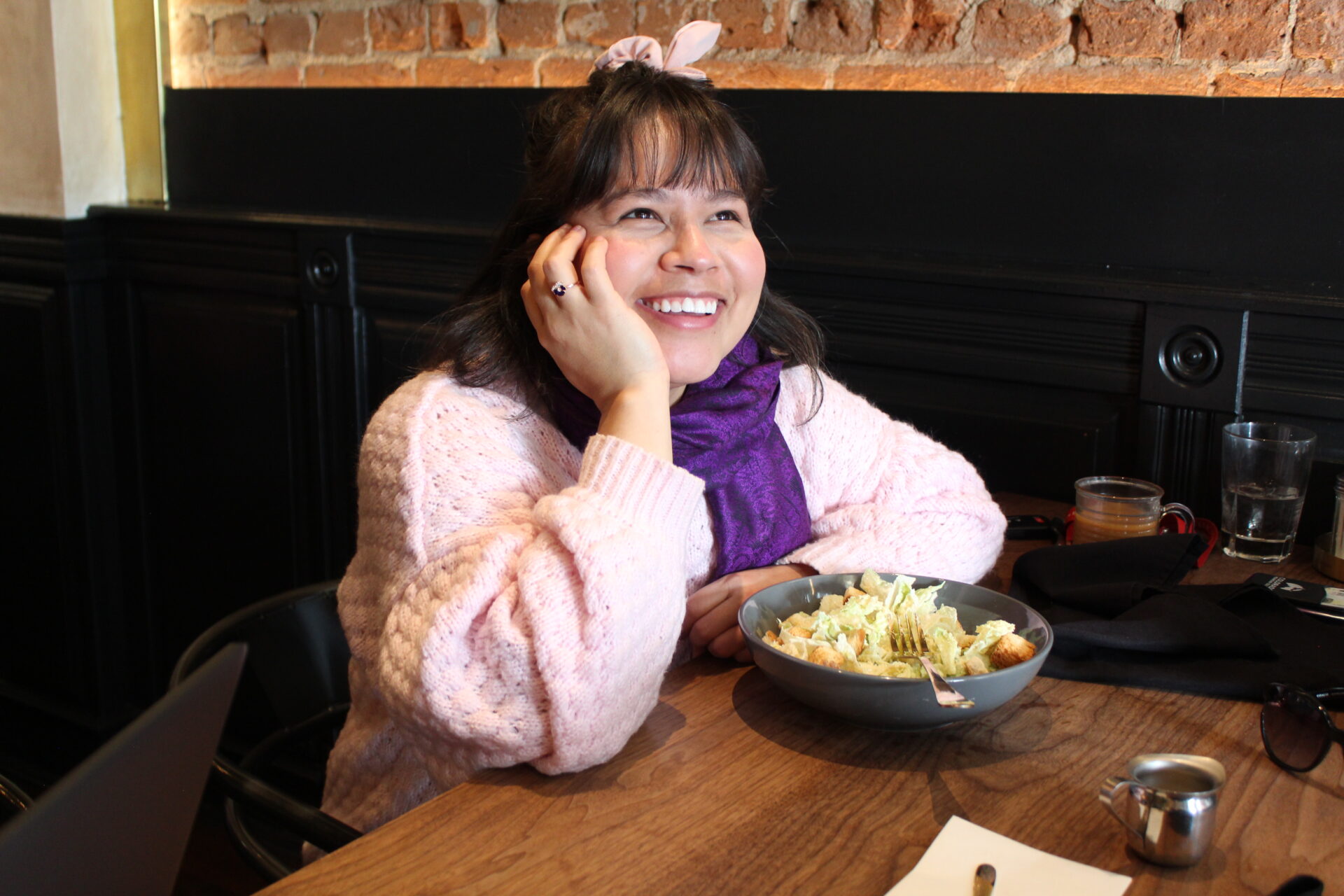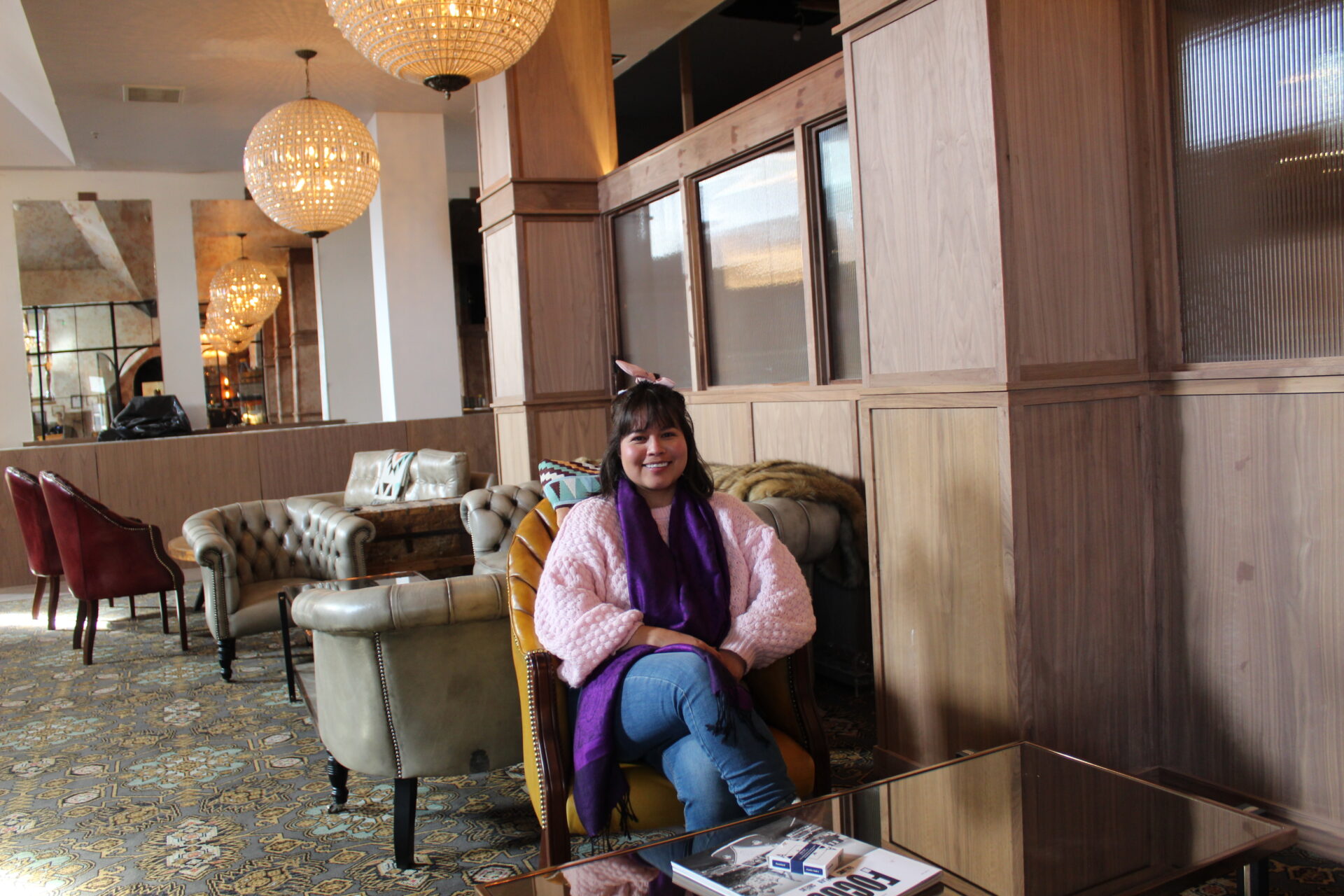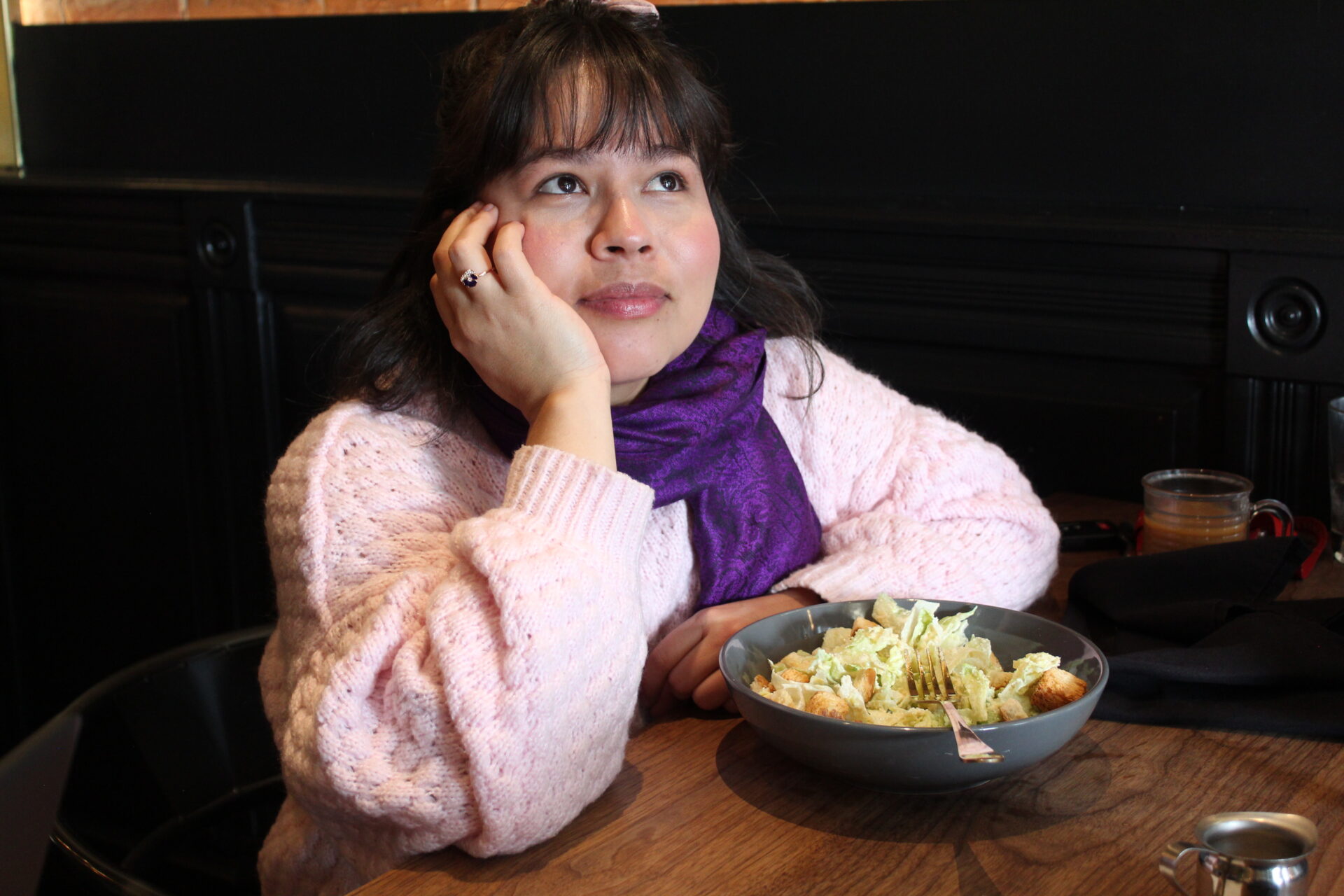Let’s talk about the relationship with food / Hablemos de la relación con la comida

Paloma es una de las miembros de nuestra coalición de comida, ella ha querido compartir con nuestra comunidad un poco de su experiencia personal con la comida y la inseguridad alimentaria, a través de una entrevista que sostuvimos hace algunas semanas, tuvimos el placer de conocer e identificarnos con su historia. Paloma también es una miembro muy activa en nuestro condado, trabaja para CMC en el campus ubicado en Leadville y participa frecuentemente de varias de las iniciativas que involucran a la comunidad Latine, nos sentimos muy orgullosos de que sea parte de una de nuestras coaliciones.
Paloma is one of the members of our Food Access Coalition. She wanted to share with our community a bit of her personal experience with food and food insecurity. Through an interview we had with her a few weeks ago, we had the pleasure of learning about her history. Paloma is also a very active member in our county, working for CMC at the Leadville campus and frequently participating in various initiatives involving the Latine community. We are very proud that she is part of one of our coalitions.
Below is the interview we had with this incredible woman:

1. Let’s talk about your relationship with food / Hablemos de tu relación con la comida
No siempre fue saludable, era más como odiar y pienso que es porque he experimentado emociones encontradas con la comida.
It wasn’t always healthy, it was more like I hated food and I think it’s because I experienced mixed emotions with food.
Sé cómo se siente no tener comida y cuando tenía me sentí controlada con las porciones y cuánto debía consumir al día. Aun si tenía hambre tenía que consumir lo que las personas con las que vivía me decían. Cuando tenía la libertad de comer lo que yo quería comer, me tenía que controlar (Una imagen relacionada con el peso) Importa cuánto peso para tener amor propio.
I know how it feels to have no food and when I did have food, I had to control the portions and how much I consumed per day. Even if I was hungry I could only eat what I was told I could eat. When I had the freedom to eat what I wanted to eat, I had to control myself. It had to do with my self-image, related to weight. A person’s weight matters to one’s self-esteem.
Siempre me llamaban con apodos: Patito feo, torcacita (Un pajarito gordito esponjado) Cachetona. Lo que contribuyó a que yo experimentara una connotación negativa de la imagen y el amor propio relacionado directamente con la comida. Aprendí que la manera en la que me demostraban amor era a través de la comida porque es importante, pero el peso lo es aún más importante.
They always called me by nicknames: Ugly Duckling, Torcacita (A fluffy chubby bird), Cachetona. This contributed to my having a negative self-image and poor self-esteem directly related to food. I learned that the way some people showed me love was through food, which is important, but weight is even more important.
2. Tell us about the first time you were aware of the relationship with the food you ate and why? / Cuéntanos sobre la primera vez que te diste cuenta de tu relación con los alimentos que ingieres y ¿por qué?
Pienso que hasta ahora mi mente está cambiando la perspectiva. Pero todo cambió cuando estaba haciendo mi maestría (ECO Psychology) Tuvo un impacto positivo porque leí “Human Supremacy” Un libro que me aportó mucho porque habla de animales y cómo pueden sentir, amar, experimentar emociones como cualquier humano y aprendí del significado en sí de que los animales son seres vivos y también como pensamos ser superiores en comparación a cuerpos. Aprendí que todo lo que pongo en mi cuerpo es importante, vengo de una familia con antecedentes de diabetes, pero mis relaciones familiares me enseñaron que la comida es amor.
I think that even up until now my mind is changing perspective. But everything changed when I was doing my master’s degree (ECO Psychology). It had a positive impact because I read Human Supremacy, a book that helped me a lot because it talked about us as animals and how you can feel, love, and experience emotions like any human and I learned that animals are living beings and also how we think we think about superiority while comparing bodies. I have learned that everything I put into my body is important. I come from a family with a history of diabetes, but my family relationships taught me that food is love.
“Aquí está este plato que preparé para ti con mucho amor, pero no hablamos de mis emociones y de las emociones que estaba experimentando” Abrí mis ojos y gracias a mi maestria vi que todo lo que pongo en mi cuerpo es importante. Me respeto a mi y a la naturaleza.
“Here is this dish that I prepared for you with a lot of love, but we did not talk about my emotions and the emotions that I was experiencing” I opened my eyes and thanks to my mastery I saw that everything I put in my body is important. I respect myself and nature.
3. What do you understand about food insecurity?/ ¿Qué entiendes por inseguridad alimentaria?
Cuando pienso en inseguridad alimentaria, pienso en privilegio y tengo un gran ejemplo:
When I think of food insecurity, I think of privilege, and I have a great example:
“Un estudiante vino a mi oficina y me contó que vivía en los dormitorios y que encontró en la basura vegetales y frutas y no podía entender como todo en buena condición estaba allí ya que él estaba luchando para poder comer. Con tiempo aquel estudiante escuchó que una de las razones por las que aquellos alimentos habían sido desechados, era porque alguien más pensaba que sabían a tierra.
“A student came to my office and told me that he lived in the dormitories and that he found vegetables and fruits in the garbage and couldn’t understand how everything in good condition was there as he was struggling to eat. Over time, that student heard that one of the reasons why those foods had been thrown away was because someone else thought they tasted like dirt.
4. Give me a brief explanation of what you understand about food insecurity within the community Latine Vs Anglo / Dame una breve explicación de lo que entiendes sobre la inseguridad alimentaria dentro de la comunidad Latine Vs Anglo
Pienso que esta inseguridad no es diferente, cuando las personas no tienen mucho dinero como quienes son la primera generación de estudiantes y no pueden acceder a alimentos de calidad. Muchos de los recursos que están disponibles, las personas blancas son quienes acceden más en comparación la comunidad Latine. Las personas latinas que no preguntan por ayuda, vienen de situaciones difíciles en sus países de origen y la mentalidad del inmigrante es tener una mejor vida y no repetir lo que vivían en sus lugares de origen.
I think this insecurity is no different, like when people don’t have a lot of money like first generation students and can’t access food. Many of the resources that are available are accessed by white people more than the Latino community. Latino people who do not ask for help come from difficult situations in their countries of origin and the mentality of the immigrant is to have a better life and not repeat what they lived in their places of origin.
Algunos inmigrantes piensan por ejemplo: “No quiero repetir ser pobre en USA cuando lo era en México”
Some immigrants think for example: “I don’t want to repeat being poor in the USA, like when I was in Mexico.”

5. Tell us a short story that comes to mind about your relationship with food / Cuéntanos una historia corta que te venga a la mente sobre tu relación con la comida.
Aprendí mucho en mi programa de maestría y lo primero que viene a mi mente es:
Recientemente he estado en un momento difícil en mi vida y la semana pasada, un grupo de amigos estaban sentados en la cafetería y me dijeron que pasara tiempo con ellos y la conversación fue, “te hemos notado y no te ves tan gorda.” Dije: –Gracias. Pero nuestro cuerpo reacciona y me senti muy incómoda. Después alguien más menciono, “pero te ves gorda cuando usas esa chaqueta que tu madre te regaló.” Me tomó tiempo procesar eso y todavía está en mi corazón cuando tengo que hablar con estas personas en particular y he querido contarles mi historia, mi relación con la comida y que mi mente todo el tiempo me repite que estoy gorda. Tras aquella conversación no comí por 3 días.
I learned a lot in my master’s program and the first thing that comes to my mind is:
I’ve recently been through a difficult time in my life and last week a group of friends were sitting in the cafeteria and they told me to hang out with them and the conversation became, “we’ve noticed you and you don’t look so fat.” I said: “Thank you.” But our bodies react, and I felt very uncomfortable. Then someone else said, “but you look fat when you’re wearing that jacket your mom gave you.” It took me time to process that and it’s still in my heart when I have to talk to these particular people and I’ve wanted to tell them my story, my relationship with food, and that my mind keeps repeating to me that I’m fat. After that conversation I didn’t eat for three days.
Cuando estas cosas pasan yo se que no tienen nada que ver conmigo y que alguien haga un comentario no es una manifestación de quien soy o de mi belleza, el hecho de que no comí y perdí algunas libras. El poder de las palabras es increíble y puede herirte y sobre todo cuando viene de personas que tu quieres. (Hablar del cuerpo de alguien puede lastimar y hacer mucho daño) Escuchó esas palabras, esas palabras viven conmigo. Si estos comentarios no existieran sería más facil para nosotros existir y ser felices.
When these things happen I know that they have nothing to do with me and that someone making a comment is not a manifestation of who I am or my beauty, or the fact that I did not eat and lost a few pounds. The power of words is incredible and can hurt you, especially when it comes from people you love. (Talking about someone’s body can hurt them, and hurt a lot) I heard those words, those words live with me. If these comments did not exist it would be easier for us to exist and be happy.
6. Why do you think that our community deserves quality food? / ¿Por qué crees que nuestra comunidad merece alimentos de calidad?
Pienso que no es solo nuestra comunidad, todos tenemos derecho, es un derecho de la humanidad tener comida de calidad!
I think it’s not just our community, we all have the right, it’s a right of humanity to have quality food!
7. Why did you decide to be part of the food coalition? / ¿Por qué decidiste formar parte de la coalición de comida?
Porque yo quiero ser un factor de cambio y si estás en un grupo de personas que quieran trabajar por cambios los cambios van a llegar, trabajando juntos. Yo sola no puedo cambiar el sistema pero si trabajo con personas apasionadas al igual que yo, podemos cambiar la narrativa.
Because I want to be someone for change and if you are in a group of people who want to work for change, the changes will come, working together. I alone cannot change the system but if I work with passionate people like me, we can change the narrative.

